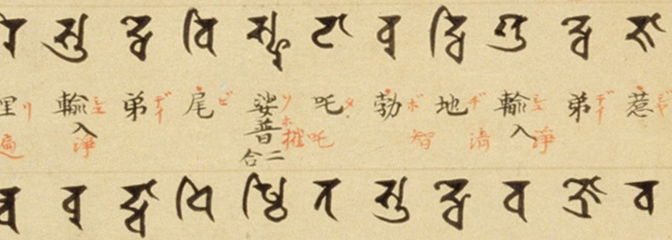Here are some very rough notes on Indo-European roots of Buddhist (and some Hindu) terms of Sanskrit origin that are fairly well-known in English. I couldn’t find a similar list anywhere else (in print or online), so I thought I’d share mine here.
[Latest revision: 1 July 2015.]
- ámṛita अमृत ‘immortality’
*n̥– (privative particle); *mer– ‘die’ (cf. Lat. im-mort-ālis, Gk ἀμβροσία ‘that pertaining to the immortals’) - avatar, S. avatāra अवतार ‘passes over, descends’
S. ava– ‘down’; *terH– (Lat. trans, Eng. through) - Buddha बुद्ध
*bheudh- ‘awaken, be aware’ (cf. Eng. bid, bode; note Grassman’s law) - Bodhisattva
bodhi बोधि ‘perfect knowledge’ + sattva सत्त्व ‘existing, true, real’ (< *es– ‘be’) - chakra; S. cakra चक्र
*kwel– ‘turn’ (cf. Lat. col-ere; Gk κύκλ-ος, βού-κολος; Ir. bua-chaill; Eng. wheel) - dharma धर्म ‘law, custom’
*dher-mn– ‘hold firmly’ (cf. Lat. firmus; Gk θρόνος) - guru गुरु ‘heavy, venerable’
*gwerH– (cf. Lat. grav-is, Gk βαρύς) - Hīnayāna हीनयान (deprecating term for Theravada Buddhism)
S. hīnā ‘inferior’, verb. adj. of jahāti ‘leaves, lets go’
*ghe-ghē-ti (cf. go, heir, etc.) - karma कर्म ‘action, deeds’
*kwer– ‘do, make’ (cf. Irish cruth) - Mahāyāna महायान
*megh– ‘great’ (Lat. mag-is; Gk μέγας); yāna ‘vehicle, way’ < *yaH– < *ei– ‘go’ (Lat. eō; Gk εἶ-μι; Eng. year) - mantra मन्त्र ‘thought’
*men– ‘mind’ + S. –tra, instrumental suffix - nirvāṇa निर्वाण ‘extinction’
S. nir– ‘out, away’ + vā-ti ‘blows’ < *weH– (cf. wind, ventum) + ṇa, abstract noun suffix; 涅槃 J. nehan - saṃsāra संसार ‘cycle of existence’
*sem– ‘same’ (cf. similar, simple, etc.); *ser– ‘flow’ - sūtra सूत्र ‘thread, string’ (hence, ‘rule’)
*syuH– (cf. sew) - svastika स्वस्तिक < S. sv-astí–
*sw- ‘well’; *es– ‘being’ - tantra तन्त्र ‘loom’ (hence, ‘system’)
*ten-tro– - Theravāda (Pali थेरवाद ‘statements of the elders’)
1) S. sthavira– ‘thick, stout, old’ < steuH– < stā–
2) S. vādah ‘sound, statement’ < *wed– (cf. ode) - veda वेद ‘knowledge’
*woid-o– - zen 禅 < C. chán < S. dhyāna ध्यान ‘thought, contemplation’
*dhyeh2 ‘notice’ (cf. Dor. sāma, Att. sēma ‘sign, token’, with first palatalisation; cf. medyos > L. medius, Att. mésos, Boet. mettos).
Header image: Tokyo, National Museum, N-8 (Hōryū-ji treasure).
